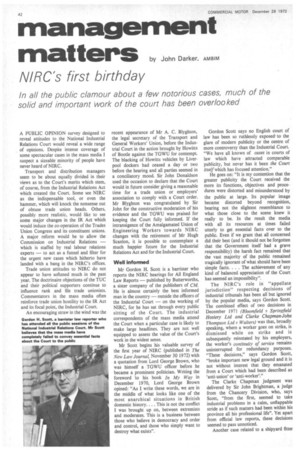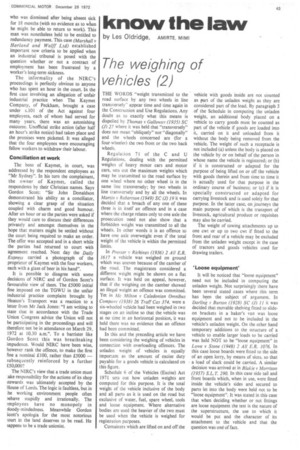management
Page 44

Page 45

If you've noticed an error in this article please click here to report it so we can fix it.
matters by John Darker AMBIM
N1RC's first birthday
In all the public clamour about a few notorious cases, much of the solid and important work of the court has been overlooked
A PUBLIC OPINION survey designed to reveal attitudes to the National Industrial Relations Court would reveal a wide range of opinions. Despite intense coverage of some spectacular cases in the mass media I suspect a sizeable minority of people have never heard of NIRC.
Transport and distribution managers seem to be about equally divided in their views as to the Court's merits which stem, of course, from the Industrial Relations Act which created the Court. Some see NIRC as the indispensable tool, or even the hammer, which will knock the nonsense out of obtuse trade union heads. Others, possibly more realistic, would like to see some major changes in the IR Act which would induce the co-operation of the Trades Union Congress and its constituent unions. A major reform would be to allow the Commission on Industrial Relations — which is staffed by real labour relations experts — to act as a funnel and filter for the urgent new cases which hitherto have landed with a bang in the NIRC's offices.
Trade union attitudes to NIRC do not appear to have softened much in the past year. The doctrinaire objections of the TUC and their political supporters continue to influence rank and file trade unionists. Commentators in the mass media often reinforce trade union hostility to the IR Act and its focal point, the Industrial Court.
An encouraging straw in the wind was the recent appearance of Mr A. C. Blyghton, the legal secretary of the Transport and General Workers' Union, before the Industrial Court in the action brought by Howitts of Bootle against the TGWU for contempt. The blacking of Howitts vehicles by Liverpool dockers had ceased a day or two before the hearing and all parties seemed in a conciliatory mood. Sir John Donaldson used the occasion to declare that the Court would in future consider giving a reasonable time for a trade union or employers' association to comply with a Court order. Mr Blyghton was congratulated by Sir John for the constructive moderation of his evidence and the TGWU was praised for keeping the Court fully informed. If the intransigence of the Amalgamated Union of Engineering Workers towards NIRC changes with the retirement of Mr Hugh Scanlon, it is possible to contemplate a much happier future for the Industrial Relations Act and for the Industrial Court.
Well informed Mr Gordon H. Scott is a barrister who reports the NIRC hearings for All England Law Reports — published by Butterworths, a sister company of the publishers of CM. He is almost certainly the best informed man in the country — outside the officers of the Industrial Court — on the working of NIRC, for he has sat through every public sitting of the Court. The industrial correspondents of the mass media attend the Court when a particular case is likely to make large headlines. They are not well equipped to assess the value of the Court's work in the widest sense.
Mr Scott begins his valuable survey of the first year of NIRC (published in The New Law Journal, November 30 1972) with a quotation from Lord George Brown, who was himself a TGWU officer before he became a prominent politician. Writing the foreword to his book In My Way in December 1970, Lord George Brown opined: "As I write these words, we are in the middle of what looks like one of the most anarchical situations in British domestic history.. . . This is not the conflict I was brought up on, between extremists and moderates. This is a business between those who believe in democracy and order and control, and those who simply want to destroy what exists". Gordon Scott says no English court of law has been so ruthlessly exposedto the glare of modern publicity or the centre of more controversy than the Industrial Court. "We have all known of cases in courts of law which have attracted comparable publicity, but never has it been the Court itself which has focused attention."
He goes on: "It is my contention that the greater publicity the Court received the more its functions, objectives and procedures were distorted and misunderstood by the public at large. Its popular image became distorted beyond recognition, bearing not the slightest resemblance to what those close to the scene knew it really to be. In the result the media with all its resources at times failed utterly to get essential facts over to the public. Even if we grant that all concerned did their best (and it thould not be forgotten that the Government itself had a grave responsibility) the harsh fact remained that the vast majority of the public remained tragically ignorant of what should have been simple facts. . . . The achievement of any kind of balanced appreciation of the Court has seemed an impossibility".
The NIRC's role in "appellate jurisdiction" respecting decisions of industrial tribunals has been all but ignored by the popular media, says Gordon Scott. The combined effect of two decisions in December 1971 (Bloomfield v Springfield Hosiery Ltd and Clarke Chapman-John Thompson Ltd v Walters) was that, broadly speaking, where a worker goes on strike, is dismissed while on strike and is subsequently reinstated by his employers, the worker's continuity of service remains uninterrupted for redundancy purposes. "These decisions," says Gordon Scott, "broke important new legal ground and it is not without interest that they emanated from a Court which had been described as 'anti-union' or 'anti-worker'."
The Clarke Chapman judgment was delivered by Sir John Brightman, a judge from the Chancery Division, who, says Scott, "from the first, seemed to take industrial problems in a calm, unflappable stride as if such matters had been within his province all his professional life". Yet apart from official law reports, these decisions seemed to pass unnoticed.
Another case related to a shipyard fitter who was dismissed after being absent sick for 18 months (with no evidence as to when he might be able to return to work). This man was nonetheless held to be entitled to redundancy payment. This case (Marshall v Harland and Wolff Ltd) established important new criteria to be applied when an industrial tribunal is posed with the question whether or not a contract of employment has been frustrated by a worker's long-term sickness.
The informality of the NIRC's proceedings is perfectly obvious to anyone who has spent an hour in the court. In the first case involving an allegation of unfair industrial practice when The Kaymet Company, of Peckham, brought a case under s.101 of the Act against four employees, each of whom had served for many years, there was an astonishing outcome. Unofficial strike action (after half an hour's strike notice) had taken place and the premises were picketed. It was alleged that the four employees were encouragiing fellow workers to withdraw their labour.
Conciliation at work The boss of Kaymet, in court; was addressed by the respondent employees as "Mr Sydney". In his turn the complainant, the owner of Kaymet, called the respondents by their Christian names. Says Gordon Scott; "Sir John Donaldson demonstrated his ability as a conciliator, showing a clear grasp of the situation coupled with charm and good humour. After an hour or so the parties were asked if they would care to discuss their differences privately and amongst themselves in the hope that matters might be settled without the court being required to make an order. The offer was accepted and in a short while the parties had returned to court with agreement reached. Next day the Daily Express carried a photograph of the proprietor of Kaymet with the four workers, each with a glass of beer in his hand".
It is possible to disagree with some decisions of NIRC and of Gordon Scott's favourable view of them. The £5000 initial fine imposed on the TGWU in the unfair industrial practice complaint brought by Heaton's Transport was a reaction to a letter from Mr Jack Jones: "I am writing to state • that in accordance with the Trade Union Congress advice the Union will not be participating in the proceedings and will therefore not be in attendance on March 29, 1972 at 10.30 a.m.". To a barrister like Gordon Scott this was breathtaking impudence. Would NIRC have been wise, however rank the offence, to make the first line a nominal £100, rather than £5000 — subsequently reinforced by a further E50,000?
The NIRCs view that a trade union must :ake responsibility for the actions of its shop newards was ultimately accepted by the House of Lords. The logic is faultless, but in he working environment people often aehave stupidly and irrationally. The :mployees have no monopoly in >loody-mindedness. Meanwhile Gordon ;cott's apologia for the most notorious :ourt in the land deserves to be read. He lappens to be a trade unionist.












































































